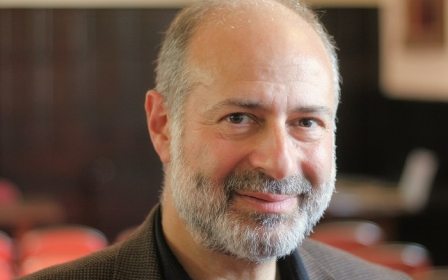Brothers no more: Yemen's Islah party faces collapse of Aden alliances

TAIZ, Yemen - It is perhaps the strangest alliance of convenience in a war defined by unusual bedfellows - the UAE, a fierce opponent of what it considers the "terrorist" Muslim Brotherhood, and the Islah party, the movement's Yemen branch.
For years they and their proxies have fought to secure the presidency of Abd Rabbuh Hadi against the rebel Houthis, and have together defended the temporary seat of the Hadi government, Aden, as the Houthis marched through the rest of the country.
But in a country where history is littered with shifting alliances, double-dealing and splits, reality is never black and white. The forces loyal to the UAE, known as the "Security Belt", support the breakaway Southern Transitional Council, while the Islahi support Hadi's push for a united Yemen.
Added to this is the current diplomatic war being fought by the UAE and its allies against Qatar, which they accuse of supporting "terrorism" through the Brotherhood.
Those fractures have led to what would seem to have been a foregone conclusion from the outset of war: the UAE's proxies in Aden are in open conflict with Islah.
Over three days last week, the Security Belt in Aden arrested 11 Islah leaders, including under-secretary Mohammed Abdul Malik, and stormed two of the party's main bases: the first in al-Tawahi district and the second in Crater, which was also burned.
Earlier this week, eight of those arrested were freed, while three remain in jail.
But the violence was the blast wave from a bomb whose fuse was lit earlier this year - the Crater headquarters were burned by Security Belt men in May, in protest at President Hadi's appointment of Islah supporter Abdul-Aziz al-Maflahi as governor of Aden.
His rise enraged southern secessionists, prompting violence and the decision by their leader, Aidarous al-Zabidi, to form the Southern Transitional Council, and the latest violence entrenched the framing of Islah as "terrorists" waiting for their chance to strike against the south.
Indeed a source in Aden's police, who supports southern independence, said Islah members should be treated the same as al-Qaeda.
"Both try to create chaos and they work for the sake of other countries," said the source, who did not wish to be named.
"When the forces stormed the headquarters of the Muslim Brotherhood in Aden, they found weapons, bombs and money.
"This is clear evidence that this headquarters is a stronghold of terrorists that threaten the security of Aden."
He admitted Islah fighters aided the defence of Aden and southern Yemen from the Houthis, but said they fought for their own interests and most could not be trusted for their historical opposition to southern independence.
"It is right that Islahi fighters helped us liberate the south in 2015, but they looted a lot of weapons and kept them to use against southerners in the future," he said.
He accused Qatar of encouraging Islah to fight the UAE in Aden, and claimed Security Belt forces found Qatari currency in the Islah headquarters.
"No one can deny the positive role of UAE in the south. It rebuilt public institutions and it does its best to help us.
Qatar wants to create chaos in Aden to let people say that the UAE did not save Aden
- Aden police source
"Qatar wants to create chaos in Aden to let people say that the UAE did not save Aden."
The Islah party denied the accusation against its members by the Security Belt, and appealed to the international community to condemn its aggression.
Mohammed al-Yusofi, a prominent party member in Taiz, said all accusations against the party were fabricated.
"Security in Aden said there were weapons, bombs and cash in our headquarters, but it had already been burned in May. This was fabricated news - we are not so stupid as to put weapons and money somewhere we know is a target."
He stated that Islah members were persecuted in Aden despite their work in securing the city.
"UAE and its supporters want to be the only force in Aden and a party like Islah is an obstacle for the UAE to behave freely.
"They started a silent war against the Islah in Aden, and they accuse us of being terrorists.
"The Islah did not fire a single bullet, but the Security Belt wants Aden to fight Islah. We will not use force; we know that force is not the solution to our problems."
To add to the compexity of the disputes, not all southerners support the Security Belt and the Southern Transitional Council - saying the council is only one of myriad groups seeking independence and does not have a monopoly.
The Islah did not fire a single bullet, but the Security Belt wants Aden to fight Islah.
- Mohammed al-Yusofi, Islah party
The Southern Movement, led by Brigadier-General Nasser al-Noba, is one of those groups which seeks independence but opposes the role of the UAE and the Southern Transitional Council in Aden.
"When Shalal, the manager of Aden's police, tries to serve the UAE in Aden, he makes new scandal," Noba tweeted after the burning of the headquarters.
Fadhl al-Rabei, a political analyst and the head of Madar Strategic Studies Centre in Aden, said the disputes between Islah and the Security Belt were more complex than at any other time and threatened the stability of the south.
"The crisis between Islah and other southern groups is part of the international disputes between Qatar and the UAE, but southerners should sit down to discuss their disputes and solve them," he said.
Stay informed with MEE's newsletters
Sign up to get the latest alerts, insights and analysis, starting with Turkey Unpacked
Middle East Eye delivers independent and unrivalled coverage and analysis of the Middle East, North Africa and beyond. To learn more about republishing this content and the associated fees, please fill out this form. More about MEE can be found here.







